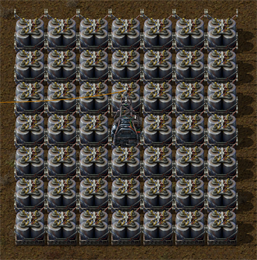Accumulator: Difference between revisions
Jump to navigation
Jump to search
No edit summary |
No edit summary |
||
| Line 1: | Line 1: | ||
Stores a limited amount of energy when available production exceeds demand, releases it in the opposite case. The basic accumulator stores up to | Stores a limited amount of energy when available production exceeds demand, releases it in the opposite case. The basic accumulator stores up to 5000 J of energy. Charge/Discharge rate is 300 W maximum. | ||
{| class="wikitable" | {| class="wikitable" | ||
| Line 8: | Line 8: | ||
| '''Maximum capacity:''' || 5 kJ | | '''Maximum capacity:''' || 5 kJ | ||
|- | |- | ||
| '''Charge rate:''' || 300 W | | '''Charge/discharge rate:''' || 300 W | ||
|- | |- | ||
| '''Req. Technology:''' || {{imagelink|electric-energy-acumulators|Electric energy accumulators}} |- | | '''Req. Technology:''' || {{imagelink|electric-energy-acumulators|Electric energy accumulators}} |- | ||
Revision as of 02:00, 7 January 2014
Stores a limited amount of energy when available production exceeds demand, releases it in the opposite case. The basic accumulator stores up to 5000 J of energy. Charge/Discharge rate is 300 W maximum.
| Recipe: | + + + => |
| Total raw: | |
| Maximum capacity: | 5 kJ |
| Charge/discharge rate: | 300 W |
| Req. Technology: | Electric energy accumulators |- |
- When discharged above maximum speed by multiple unconnected poles, will distribute energy unequally (some may get 100% demand, others 0%)
- May be used to provide limited amount of power (multiples of maximum charge rate) to a section of the grid
- Produces light when charging and discharging
See also
Examples
